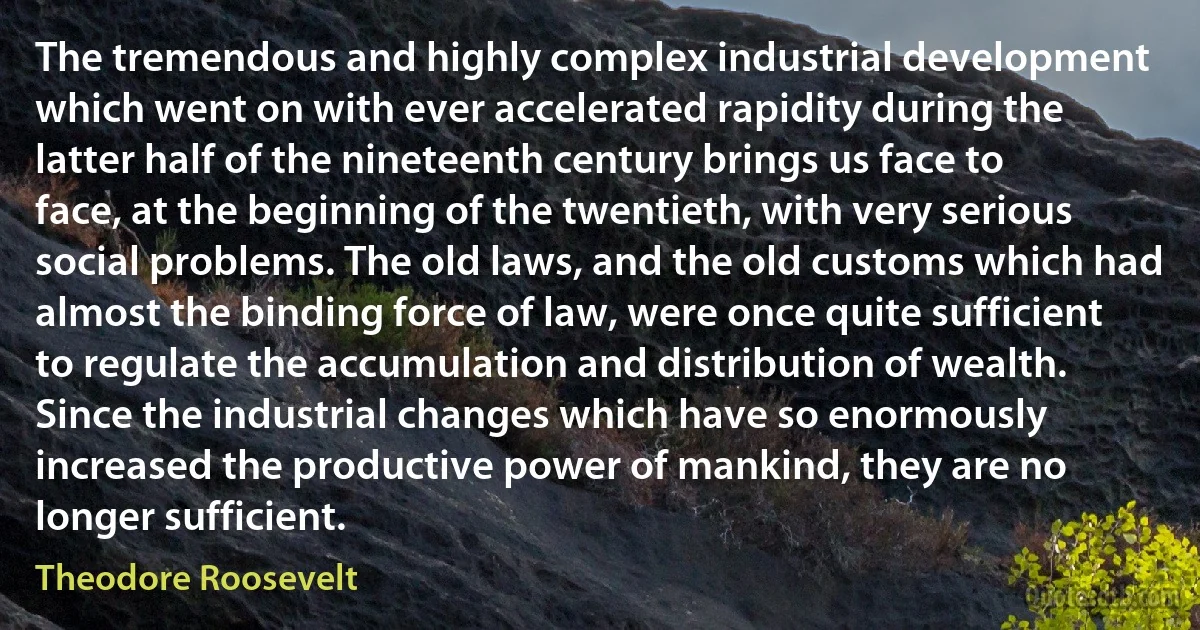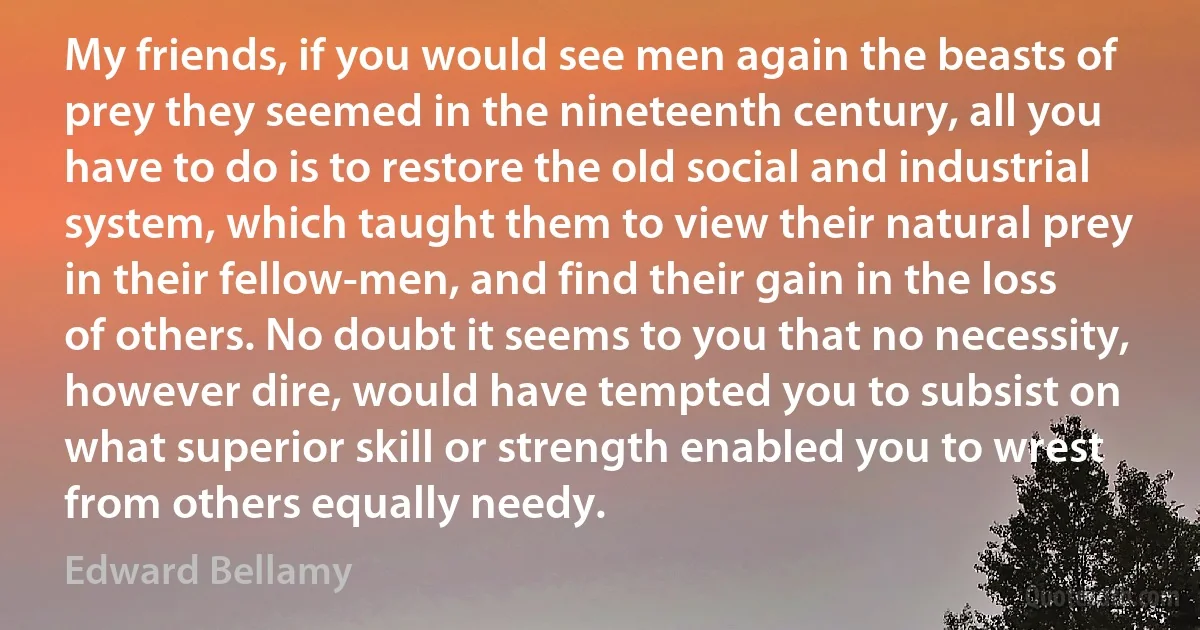Nineteenth Quotes - page 4
Twentieth-century paleontologists have fallen into the bad habit of reconstructing the dinosaurs' life functions by using crocodiles as a living model. But the earliest researchers of the nineteenth century proved beyond a doubt that the dinosaurs' powerful hind limbs must have operated like the limbs of gigantic birds.

Robert T. Bakker
A builder. A rough and ready plasterer. A colour grinder. He Courbet is like a Roman bricklayer. And yet he's another true painter. There's no one in this century that surpasses him. Even though he rolls up his sleeves, plugs up his ears, demolishes columns, his workmanship is classical!... His view was always compositional. His vision remained traditional. Like his palette-knife, he used it only out of doors. He was sophisticated and brought his work to a high finish... His great contribution is the poetic introduction of nature - the smell of damp leaves, mossy forest cuttings - into nineteenth century painting; the murmur of rain, woodlands shadows, sunlight moving under trees. The sea. And snow, he painted snow like no one else!

Paul Cézanne
Spinoza, then, emerged as the supreme philosophical bogeyman of Early Enlightenment Europe. Admittedly, historians have rarely emphasized this. It has been much more common, and still is, to claim that Spinoza was rarely understood and had very little influence, a typical example of an abiding historiographical refrain which appears to be totally untrue but nevertheless, since the nineteenth century, has exerted an enduring appeal for all manner of scholars. In fact, no one else during the century 1650–1750 remotely rivalled Spinoza's notoriety as the chief challenger of the fundamentals of revealed religion, received ideas, tradition, morality, and what was everywhere regarded, in absolutist and non-absolutist states alike, as divinely constituted political authority.

Baruch Spinoza
The rediscovery of Spinoza by the Germans contributed to the shaping of the cultural destinies of the German people for almost two hundred years. Just as at the time of the Reformation no other spiritual force was as potent in German life as the Bible, so during the eighteenth and nineteenth centuries no other intellectual force so dominated German life as Spinozism. Spinoza became the magnet to German steel. Except for Immanuel Kant and Herbart, Spinoza attracted every great intellectual figure in Germany during the last two centuries, from the greatest, Goethe, to the purest, Lessing.

Baruch Spinoza
However, his contemporary, Leibnitz, the father of the German enlightenment, who created an optimistic world-picture, always remained only a philosopher for philosophers. Even Immanuel Kant, although always famous, was never popular. In his own fatherland he was all but forgotten for most of the nineteenth century until revived by Hermann Cohen and his school. Spinoza, however, was never exhumed because he was never buried. Kant, because of his exclusive intellectuality, has influenced only his students, while Spinoza, because of his emotional appeal, has ruled even those who have never heard his name.

Baruch Spinoza
In the content of his work it is interesting to notice that he is profoundly English. His romanticism, and his choice of the theme of Time and Age – both these look back to the Anglo-Saxons and forward to the nineteenth century. Yet his form is French. The heart is insular and romantic, the head cool and continental: it is a good combination.

John Gower
I confess that I do not understand the principle on which the power to fix a minimum for the wages of women can be denied by those who admit the power to fix a maximum for their hours of work. I fully assent to the proposition that here as elsewhere the distinctions of the law are distinctions of degree, but I perceive no difference in the kind or degree of interference with liberty, the only matter with which we have any concern, between the one case and the other. The bargain is equally affected whichever half you regulate.... It will need more than the Nineteenth Amendment to convince me that there are no differences between men and women, or that legislation cannot take those differences into account.

Oliver Wendell Holmes Jr.
There are Seven Seals to be opened, that is to say, Seven mysteries to know, and Seven difficulties to overcome, Seven trumpets to sound, and Seven cups to empty.
The Apocalypse is, to those who receive the nineteenth degree, the Apotheosis of that Sublime Faith which aspires to God alone, and despises all the pomps and works of Lucifer. Lucifer, the Light-bearer! Strange and mysterious name to give to the Spirit of Darkness! Lucifer, the Son of the Morning! Is it he who bears the Light, and with its splendors intolerable blinds feeble, sensual, or selfish Souls! Doubt it not! for traditions are full of Divine Revelations and Inspirations: and Inspiration is not of one Age nor of one Creed. Plato and Philo, also, were inspired.

Albert Pike
The convention by which the great events in biblical or secular history could be enacted only by magnificent physical specimens, handsome and well-groomed, went on for a long time - till the middle of the nineteenth century. Only a very few artists - perhaps only Rembrandt and Caravaggio in the first rank - were independent enough to stand against it. And I think that this convention, which was an element in the so-called grand manner, became a deadening influence on the European mind. It deadened our sense of truth, even our sense of moral responsibility.

Kenneth Clark
It remains true that Michelangelo's intensely personal use of the nude greatly altered its character. He changed it from a means of embodying ideas to a means of expressing emotions; he transformed it from the world of living to the world of becoming. And he projected his world of the imagination with such unequaled artistic power that its shadow fell on every male nude in art for three hundred and fifty years. Painters either imitated his heroic poses and proportions or they reacted against them self-consciously and sought a new repertoire of attitudes in the art of fifth-century Greece. In the nineteenth century the ghost of Michelangelo was still posing the models in art schools.

Kenneth Clark
Punishment of cadets had been artfully crafted. In the early nineteenth century, West Point officials deemed manual labor an inappropriate punishment for a cadet: It would have been an ungentlemanly task for a future officer. But they could make him do something that was tiring, embarrassing, and, most excruciating, accomplished nothing. So cadets ever since have been awarded "Area tours," each representing an hour- two hours on Friday afternoon, and then three on Saturday- walking in our dress gray uniforms with rifles across the Area. As my bemused father explained to me, the Area does not make you smarter, braver, or more expert; even trench digging would offer some tangible benefit. At the academy, where we hoarded free minutes, walking the yard meant wasted hours.

Stanley A. McChrystal
Recalling all the erroneous things that doctors have been able to say about sex or madness does us a fat lot of good. I think that what is currently politically important is to determine the regime of verediction established at a given moment ... on the basis of which you can now recognize, for example, that doctors in the nineteenth century said so many stupid things about sex. ... It is not so much the history of the true or the history of the false as the history of verediction which has a political significance.

Michel Foucault
Here I come to one of the memoir writer's difficulties - one of the reasons why, though I read so many, so many are failures. They leave out the person to whom things happened. The reason is that it is so difficult to describe any human being. So they say: ‘This is what happened'; but they do not say what the person was like to whom it happened. Who was I then? Adeline Virginia Stephen, the second daughter of Leslie and Julia Prinsep Stephen, born on 25th January 1882, descended from a great many people, some famous, others obscure; born into a large connection, born not of rich parents, but of well-to-do parents, born into a very communicative, literate, letter writing, visiting, articulate, late nineteenth century world.

Virginia Woolf
On the Arguement from Scripture: "Ever since the nineteenth century, scholarly theologians have made an overwhelming case that the gospels are not reliable accounts of what happened in the history of the real world. All were written long after the death of Jesus, and also after the epistles of Paul, which mentioned almost none of the alleged facts of Jesus's life. All were then copied and recopied ... by falilible scribes who, in any case, had their own religious agendas."

Richard Dawkins
It will take time to get a more settled sense of Thompson's distinction as a historian and a writer. His work spans too many forms for easy judgement, and its aura can be a temptation to short cuts. But a tension between what might be called his nineteenth and his eighteenth century sensibility was certainly at the creative centre of it.

Perry Anderson
The nineteenth century moved fast and furious, so that one who moved in it felt sometimes giddy, watching it spin; but the eleventh moved faster and more furiously still. The Norman conquest of England was an immense effort, and its consequences were far-reaching, but the first crusade was altogether the most interesting event in European history. Never has the western world shown anything like the energy and unity with which she then flung herself on the East, and for the moment made the East recoil. Barring her family quarrels, Europe was a unity then, in thought, will and object. Christianity was the unit.

Henry Adams



